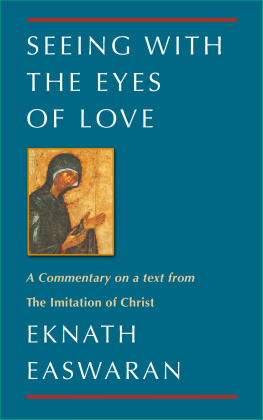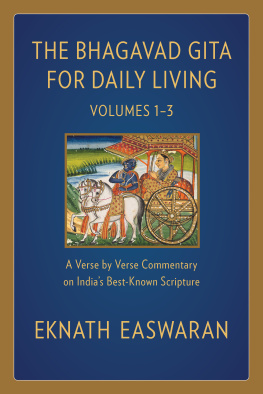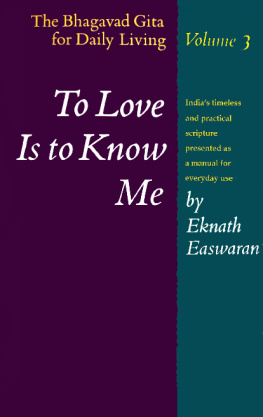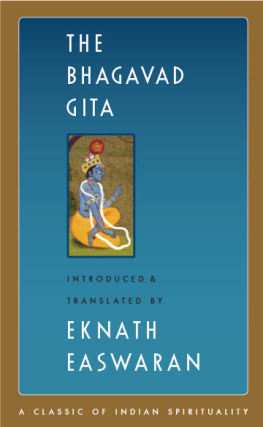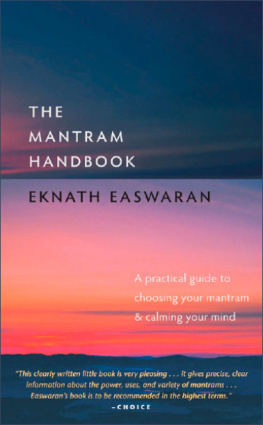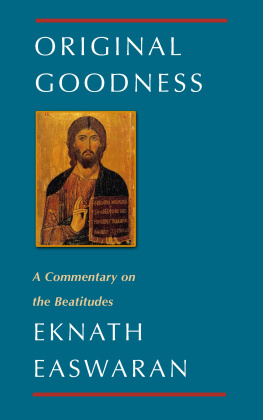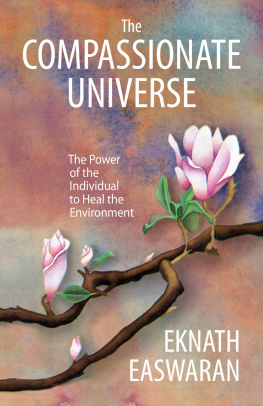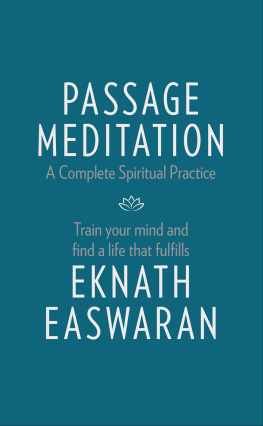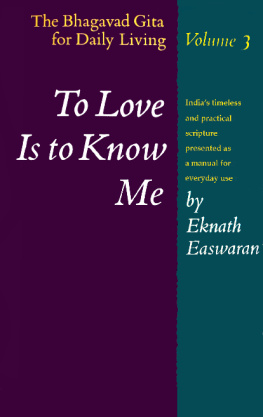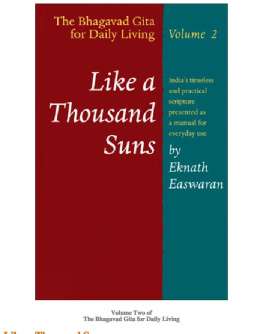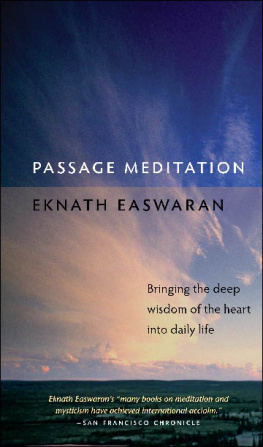Seeing With the Eyes of Love
A COMMENTARY ON A TEXT FROM
THE IMITATION OF CHRIST
With An Afterword by Carol Lee Flinders
NILGIRI PRESS
20191014
Table of Contents
Introduction
In my state of Kerala there is a Christian tradition going back nearly two thousand years. The Apostle Thomas is believed to have come to the coast of Kerala and founded a Christian community there a living link to Christ that would mean Christianity came to Kerala well before reaching most of Europe. In my college classes there were students from these ancient Christian families, golden-brown and dark-eyed like the rest of us and carrying similar surnames, but with given names like David, Joseph, and Peter.
However, these Christian communities are concentrated in the coastal part of Kerala, around Cochin and Travancore. My village was inland, so I dont think I had any exposure at all to the message of Christ until a Christian teacher joined the faculty of my high school. My Uncle Appa, our schoolmaster, invited him regularly to our ancestral home, and I imagine my interest in the teachings of Christ was probably first kindled by meeting this man. Not long afterwards, I left home for college a Catholic college located some fifty miles from my village and there I met an individual who to my mind lived out those teachings perfectly.
The headmaster of my college was Father John Palakaran, a Catholic priest from a distinguished Kerala Christian family who had taken his degrees at Edinburgh University. English, French, Latin, Greek, Sanskrit, Malayalamin all of these he was fluent. He was a brilliant scholar, though he carried it so lightly it wasnt until years later that I realized the extent of his erudition. Father John always wore his black academic robes in the classroom. He had a deep, resonant voice, and he smoked the kind of large cigars that would become the trademark of the film star Edward G. Robinson.
The overall impression was intimidating, and as a sixteen-year-old Hindu boy fresh from the village, I was intimidated rather easily. From the very beginning, though, I sensed that this man lived for his students, and in return I gave him my utmost respect. I had a class with him just one hour a week during that first year, and I used to sit in the front row lost in admiration. I had never heard English spoken so sonorously, with such wonderful broad a s. I wanted to sound just like that!
Father John was able to see that I was having a hard time when it came to speaking English. I could read it well, and write it too, but I had never spoken English before. When the instructors asked a question, I had to frame my answer in Malayalam first and then translate it into English. By the time my answer was ready, the discussion had moved on. This was thoroughly upsetting to me, because in high school I had been an excellent student.
That first year was difficult for me in another way too: I had never been away from home before. The college officials must have realized that would be the case for most of their first-year students, because they did not bring us into dormitories yet. Instead we were lodged with local families, where we could eat our meals and be treated almost as if we were at home. It was a good way to ease the transition into college life, but nonetheless I was homesick quite a lot of the time.
Father John began to understand my difficulties. His way of helping me learn to speak English was to encourage me to enter the college debate program. I wanted to do everything I could to please him, and that gave me the motivation to work extremely hard. He wasnt in the habit of paying compliments, and that didnt trouble me since my grandmother wasnt either. Instead, he supported me in quiet ways. Every now and then, for example, guessing what it would mean to me, he used to call me into his private study to talk not in his office but in his own rooms, which were part of what we called the Bishops Palace. He had a handsome study in the Victorian mode, and because I held him in such esteem I would look all around to see what kind of pictures were on the wall, what books he kept on the shelfeverything. His academic robes would be hanging in the corner during these visits; he would be wearing his simple white cassock.
I remember him calling me there one afternoon after he had heard me speak in class. We chatted a while and then he asked casually, Did you have breakfast?
Yes, Father, I said, rather bewildered by the question. I had a good breakfast.
Well, then, if you had a good breakfast, he said, leaning forward full of intensity, why did you swallow the last words of every sentence?
It was not a question he would have to ask me twice!
It was about a year later when one of his assistants came to me in class and said, Father John wants you. I hurried to his rooms and found him reclining in an armchair with his feet up, puffing an after-lunch cigar.
You have probably heard there is an intercollegiate debate coming up. I had. I knew it covered the whole region and was the most prestigious debate we could compete in and that it was for Catholic colleges only. Since I wasnt Catholic, I hadnt even thought about participating.
I want you to represent this college.
I was overwhelmed I literally couldnt believe it. And what if I let him down? I must have muttered something to that effect because he cut me off with a gesture. Ill be the judge of whether you are equal to it, he said. Im not consulting you.
My eyes filled with tears. When I could finally speak I started to ask, If I fare badly...
He cut me short with a cheerful shrug. Just dont come back!
To my great relief I found that none of the students appeared to resent Father Johns decision to send a Hindu boy to represent a Catholic college. In fact, when my debate partner and I left for the event, a crowd of our schoolmates came to the train station to see us off. Still, I felt quite out of place and alone. The debate was held in a big, crowded auditorium, and besides probably all being Catholic, all the other contestants seemed to be wearing European suits.
At the end of the day, to my surprise, the panel of judges not only gave me and my partner the intercollegiate trophy; they gave me first place for individual elocution. By the time we reached our campus that night the news had preceded us, and hundreds of students met our train and followed as we carried the trophy to the Bishops Palace.
Father John opened the door and looked at me. So youve come back, he said.
During the four years I spent at college, without calling attention to what he was doing, Father John managed to work a great transformation in me. He helped me find confidence, but detachment as well. I was so grateful that I kept a picture of him in my room. And, inevitably, rumors got back to my village: I was said to be on the verge of becoming a Catholic. My granny only smiled. She knew that it wasnt a creed or religion I was drawn to, but the sheer nobility of the man himself.
I never considered converting, and nothing in my relationship to Father John ever made me think he expected me to. Im sure he gave me books, for I must have been as curious about his religious background as I was about every detail of his life. He may even have given me The Imitation of Christ . But I was young, and my interests encouraged by him were wide. I had not yet reached the point where religious literature had any personal meaning for me.
In fact, it wasnt through books at all, but through the lives of individuals like Father John that the message of Christ first reached me. I have had the good fortune to know quite a number of Christian men and women like him, both Protestants and Catholics, who lived truly selfless lives. Such individuals are indeed the lamp set high for all men to see of which Christ spoke. Long before I took to the spiritual life myself, they helped me understand that the selfless life of which all the worlds scriptures speak is also a life of beauty.

